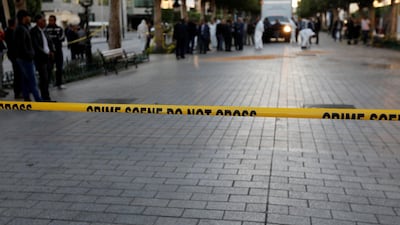Anis Matri, relaxes behind the bar at the Tunis' club, a dusty photograph of Che Guevara balanced on the shelf behind him. It's still early, though the bar's regular patrons are beginning to file in and fill the air with smoke. “I don’t think things are any safer now than they were a few years ago," he says. “They’re still there. They’re still on the border with Libya, with Algeria. Nothing’s really changed.”
From the October suicide bombing in central Tunis, to an ISIS-claimed attack on a security patrol last week at Kasserine, close to the Algerian border, the threat of terrorism lingers over Tunisia, despite the forces of the security apparatus arrayed against them.
On Friday, the Ministry of Interior announced that it had arrested 12 suspected members of ISIS and seized a large quantity of bomb making materials. Few details were given on how these may have been connected to either the attack in Tunis or the assault in Kasserine.
Over recent years, Tunisia's link to extremism has been established for many, with the savage 2015 attacks at the capital's Bardo Museum and the resort town of Sousse sealing the association. Some 2,900 Tunisians are now thought to have left their homes in Tunisia to fight in Iraq and Syria, making the country one of the highest exporters of foreign fighters in the world.
According to the Rescue Association for Tunisians Trapped Abroad, the organisation liaising between the families of Tunisia's foreign fighters and the authorities, 970 fighters have since returned.
Analysts caution against exaggerating the significance of the threat posed by the latest spate of attacks. “I would not call it an sharp rise,’ said Ludovico Carlino, a senior Middle East and North Africa analyst with IHS Markit, an information and analysis firm. “But it’s true that there are alarming signals from a security perspective.
"This is the second jihadist attack in just a month; the Tunisian police has carried out some relevant operations dismantling terrorist cells and Tunisia is again mentioned in the jihadist propaganda, such as in the latest edition of the ISIS newsletter Al Naba in which the group criticised the decision by the government to approve the law stipulating that women had the same rights as men in inheritance cases."
_______________
Read more:
Tunisia prime minister accused of coup plot and dismisses allegation as 'a joke'
Saudis to lend Tunisia $500 million and finance projects
Slain French monks among 19 to be beatified in Algeria
_______________
However, the scale of Tunisia's local militant movement is easily overstated. Last week's attack on a security patrol served to both underscore the limited nature of the group's resources, as well as its unwavering commitment to violence.
According to witnesses, militants approached the security patrol on motorcycles before opening fire with automatic weapons, injuring a civilian bystander. Likewise, the suicide bombing in central Tunis, though injuring many, killed only the bomber herself, an unemployed graduate from the coastal town of Mahdia. According to Tunisia's interior minister, the bomber had pledged allegiance to ISIS. The group has yet to claim the attack , a potential indication of its perceived failure.
Harried by the state’s aggressive security measures, with their freedom to operate dwindling, Tunisia’s terrorist fighters are finding themselves in bitter competition with each other for both resources and recruits.
“What it’s interesting is that the latest ISIS attack in Tunisia took place in Kasserine, an area not distant from Jebel Chambi, the traditional stronghold of, Katiba Okba Ibn Nafaa," Mr Carlino said, referring to the Al Qaeda in the Maghreb-linked militant group also known by its acronym KOIN.
“It might be that some KOIN militants have defected and embraced the Islamic State banner, although it’s worth stressing that that area of Tunisia has been quite prone to jihadist activity for a while now.”
There are also indications that the supply lines between Tunisia and Libya, considered to be the staging grounds for both 2015 attacks, are succumbing to the pressure of the state and the security services. But the shrinking numbers passing across the border could equally be a consequence of shifting priorities for ISIS.
“The group is trying to re-organise its ranks there,” Mr Carlino said, “and attempting to attract militants inside Libyan territory instead of facilitating their transfer into Tunisia.”
Though recent attacks on the security services may have been limited in scope, their lethal potential cannot be overlooked.
In July, an attack by KOIN fighters on the security services in Tunisia's northwest killed six people. By all accounts, the attack lasted only moments.
"It was a treacherous ambush," Omar Benaissi, an official from the local area told The Washington Post. Using a home-made bomb and old Kalashnikovs, "the six were killed in the moment the attack happened".
For Anis, so much of this has become background noise. He came to Tunis from Jendouba on the Algerian border some yeas ago. He has already lived much of the theory others talk about. He cleans an ashtray, adding to the towering stack forming by the sink. "Police are good, but when these people start talking about religion and what they think it means, it's people. It's the people we need to beat this, not the police."

